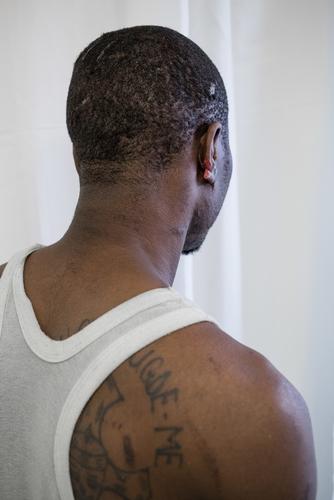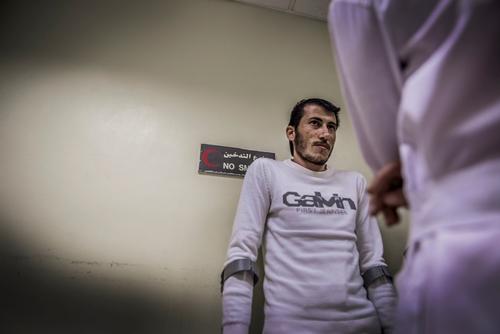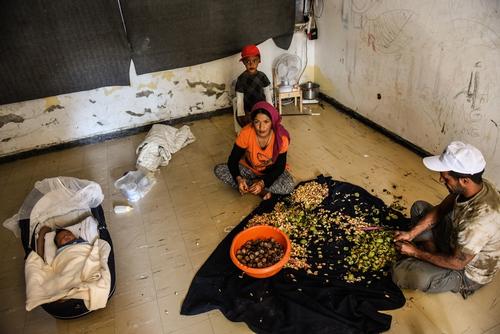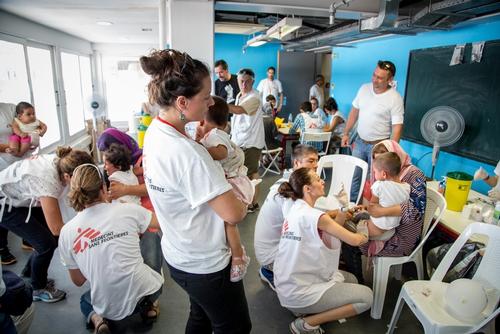The Victims of Violence (VoV) project in Athens has been running since October 2014. Médecins Sans Frontières (MSF) works alongside the Greek Council for Refugees and the BABEL Day Centre to provide medical and psychological care, as well as legal advice and social assistance to asylum seekers, refugees and migrants who are survivors of torture or extreme violence. Nearly 60,000 refugees are currently “trapped” in Greece and among them are those who have been persecuted and tortured for their political or religious beliefs, their race, their gender or their sexual identity. The aim of the VoV project is to restore people’s dignity, and their mental and physical health.
Ioanna Kotsioni, MSF’s Project Coordinator, talks more about the VoV and its goals.
Tell us more about the VoV project
The project is run by an inter-disciplinary team of professionals. Since opening in October 2014, over 400 people from 38 different countries – survivors of torture and extreme violence – have been seen by MSF and our partners. MSF professionals have assisted 238 people. The case management is done in cooperation with a range of people, including medical doctors, physiotherapists, psychologists, psychiatrists, social workers and cultural mediators.
Torture is not a disease; it is a traumatic experience that destroys someone’s self-esteem and dignity. For that reason it is very important to help survivors re-establish their self-worth and their trust in other human beings. To achieve this we work on many different levels. For example, we need to support people with their asylum process and this is done through our partnership with the legal aid organization. As well as providing them with medical care, we help people integrate into the host society, and support them in meeting their daily needs. Our social workers ensure shelter for them, as well as access to basic things such as food, and help them to find a job.
We also have a very wide network of physicians and specialists who work either in the national health system or as private practitioners and many of them offer their services pro bono. Thanks to this we’re able to ensure a more specialised treatment. For example, we work with dentists and a maxillofacial surgeon so we can offer prosthetics to people who have lost their teeth as a result of violence.
What medical needs do you see at the clinic?
The survivors that we see have been subjected to physical and psychological violence, as well as sexual abuse. The things that they have been through have left them with chronic health problems, both mental and physical, that need to be treated over time. The main problems identified and managed by the medical doctors are musculoskeletal, neurological and gastrointestinal issues. Almost 63 percent of patients present with problems related to their muscles or bones. Many have chronic pain. There are also people with skin problems, from being burned or from electric shocks. Some have become pregnant as a result of being raped, or they have genitourinary problems or sexually-transmitted infections from sexual abuse.
Who are the people you see at the clinic?
In the last three months we’ve seen a big increase in the number of new people coming to the clinic and we have had 40 new cases a month – a four-fold rise. We are expanding our capacity accordingly. Almost all of our beneficiaries have suffered violence in their countries of origin and for most of them this is why they fled, because they were in danger, they were persecuted. Then, in addition, many of them have suffered violence on their journey, especially if they spent long periods of time in transit countries such as Libya. There are also many, especially those who arrived in Greece a few years ago, who have spent considerable periods of time in immigration detention facilities. They talk about the difficult conditions in the detention centres and their time in them as a traumatic experience.
I’ve been in Greece for four years. I queue for food, I queue for a shower, I queue for a place to sleep, I queue to get my papers … I queue to feel like a human being. Tell me, how much longer? How much longer do I have to queue?
“I’ve been in Greece for four years. I queue for food, I queue for a shower, I queue for a place to sleep, I queue to get my papers … I queue to feel like a human being. Tell me, how much longer? How much longer do I have to queue?”
You have worked in MSF refugee projects before, why is this one different?
As the project coordinator, I am responsible for supporting the team of health and other professionals that work directly with the victims of violence. It is an extremely interesting project for all the team and for me personally. Here you really have the opportunity to work long-term with the beneficiaries and to follow them for a long period of time and witness their progress and how they are coping with integrating into the host society. We have people that we have been seeing for more than a year. Most we follow over several months. You can really see the difference that you’re making because you become very involved in their lives. We’ve had former patients call us from another European country or from a Greek island where they’ve found a summer job just to check in on us. We’ve helped them regain confidence in themselves and to move on with their lives. It is very rewarding.
What have you learned from your experiences so far?
I know now that torture is very widespread. People are tortured systematically in many countries, and in many countries where MSF works. There have been huge efforts from organizations and groups that are working with survivors of torture worldwide to push for rehabilitation to be a legally recognized right, and it is outlined in the 1984 Convention against Torture. However, we need to encourage authorities and organizations to make rehabilitation services available. This is a right that all torture survivors have, but for example in countries like Greece there are no services in place that are not provided by NGOs.
"What we see every day is that our beneficiaries who have suffered torture do not have access to the asylum system. They have no shelter and are unable to meet their basic needs. It is difficult for us to cover their chronic health requirements and they do not have access to services that would help improve their physical and mental health."

On International Day in Support of Victims of Torture is there a personal message that you would like to share?
Working with these people every day you realise that they are the ones who have survived and that they are in a constant struggle to survive. We only see the people who have made it this far. Many more are suffering torture and violence worldwide and might still be in prison in their country of origin or might not be able to flee. We shouldn’t forget about them.






